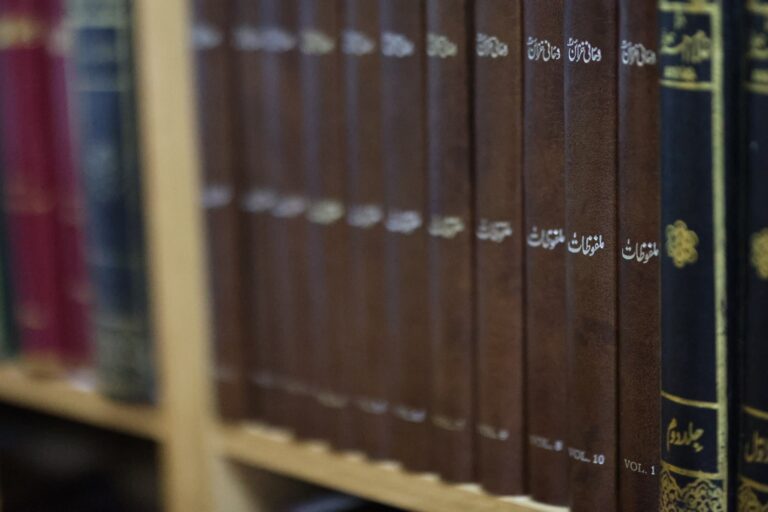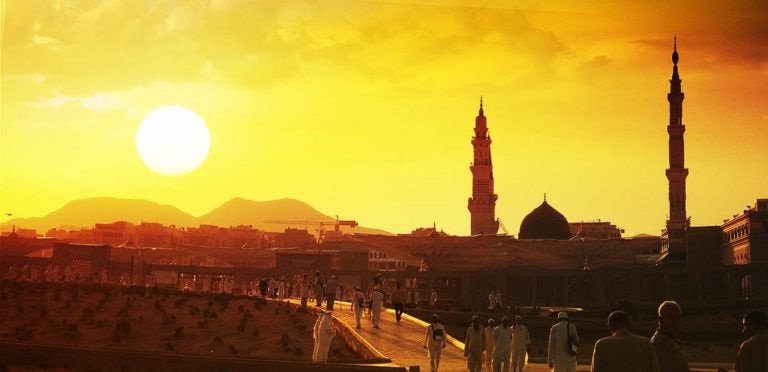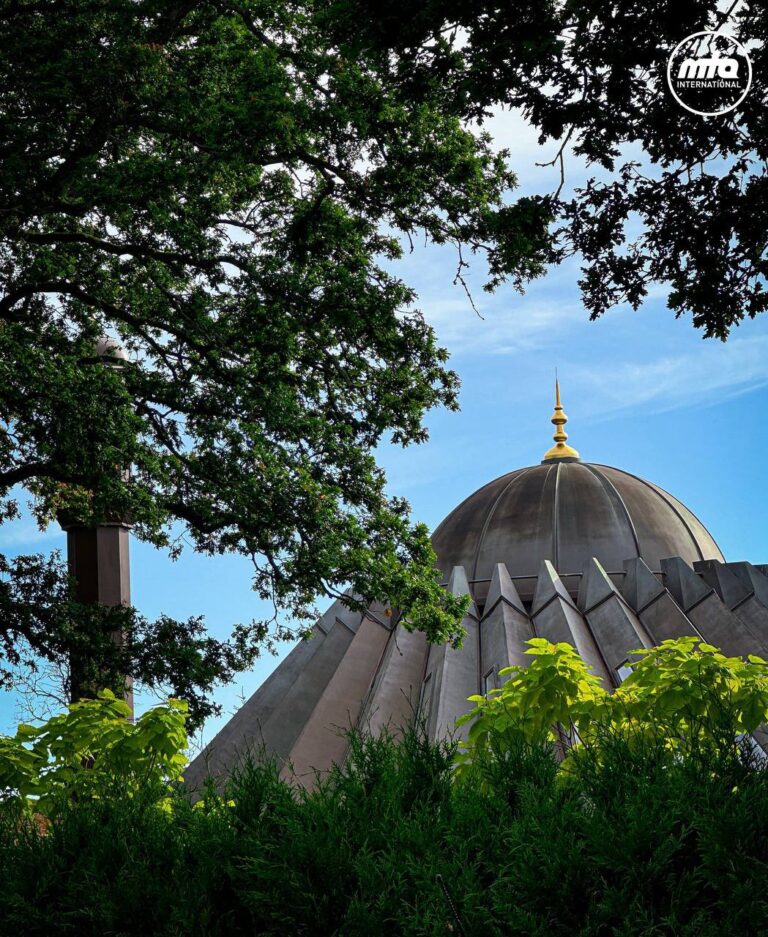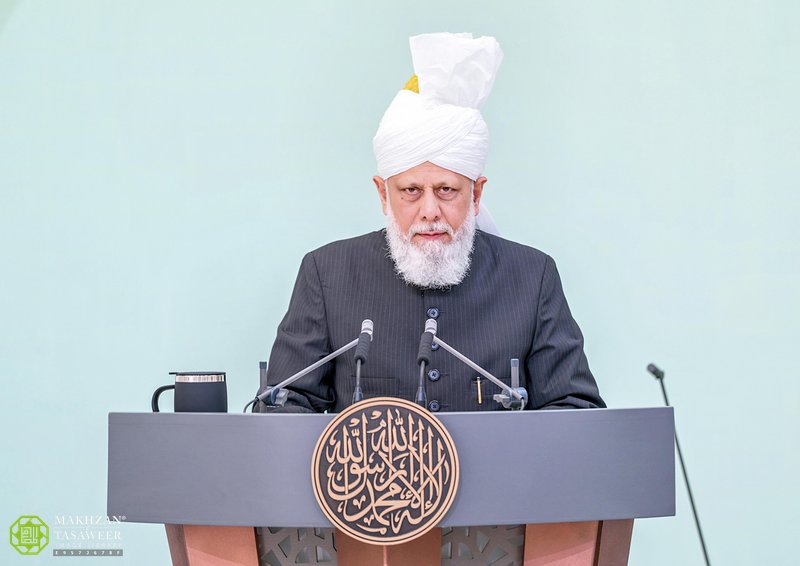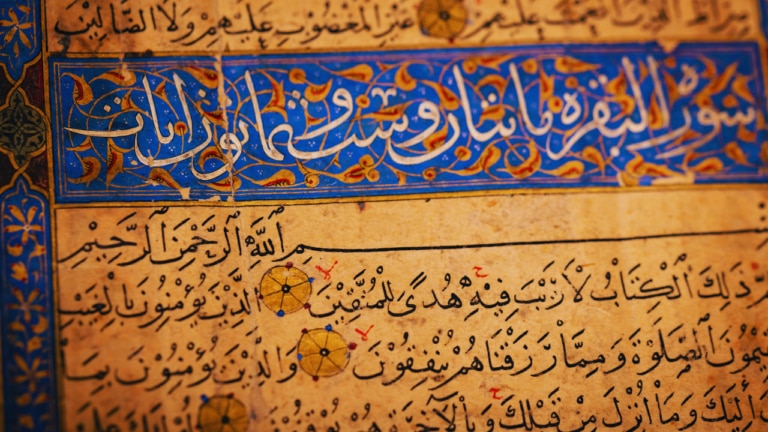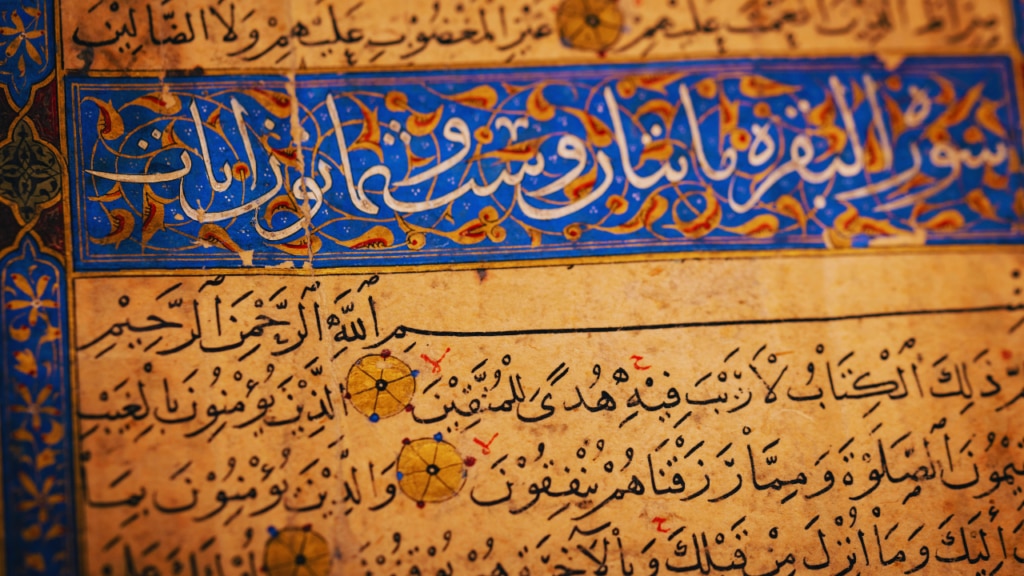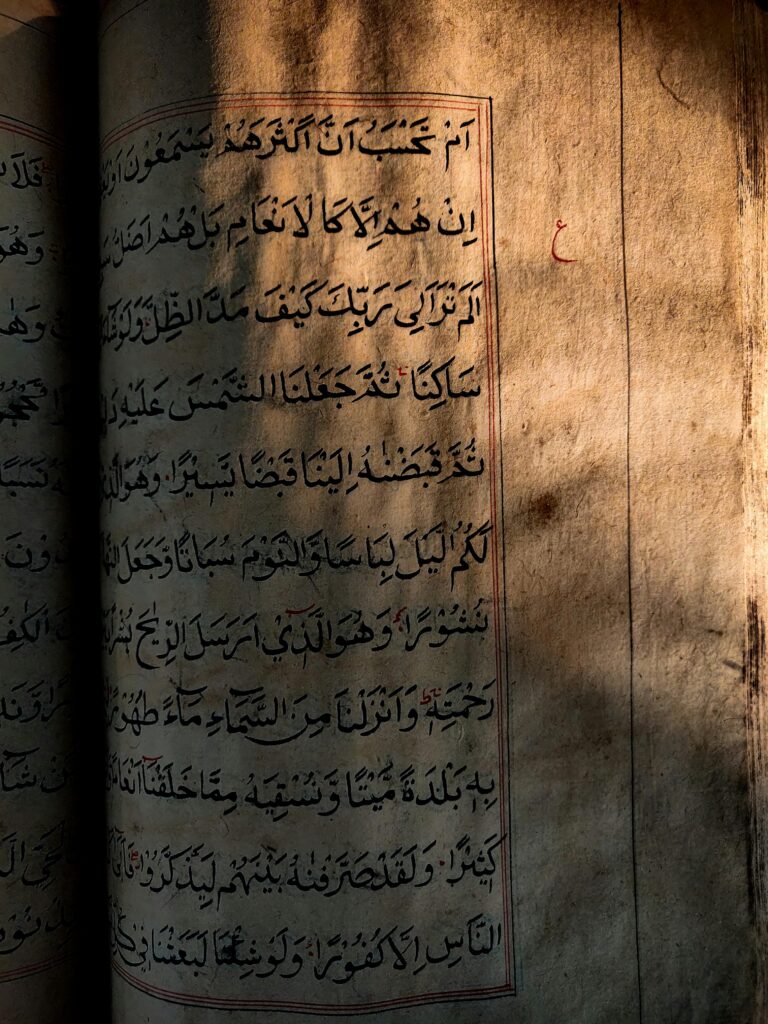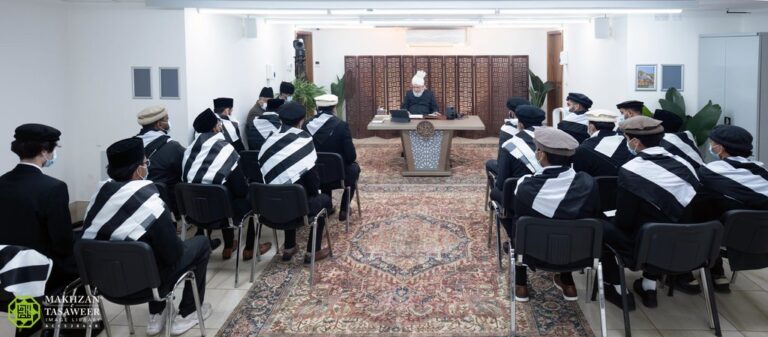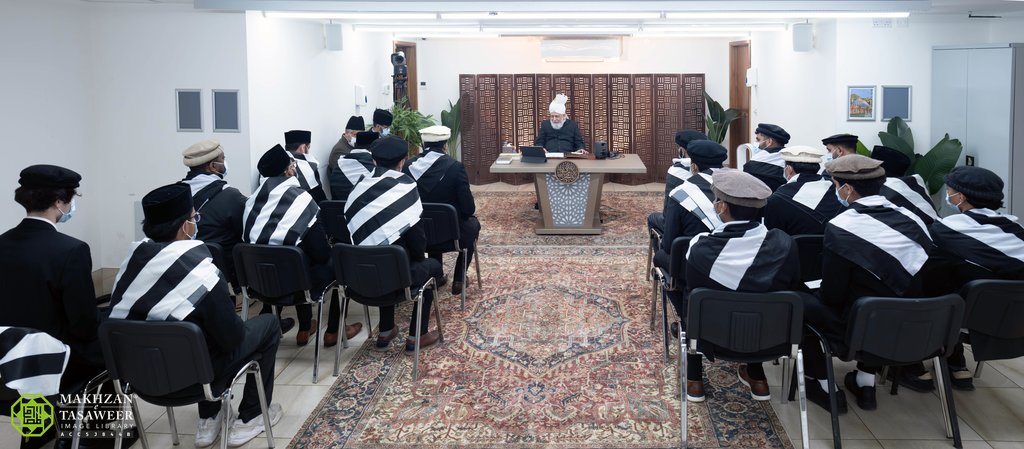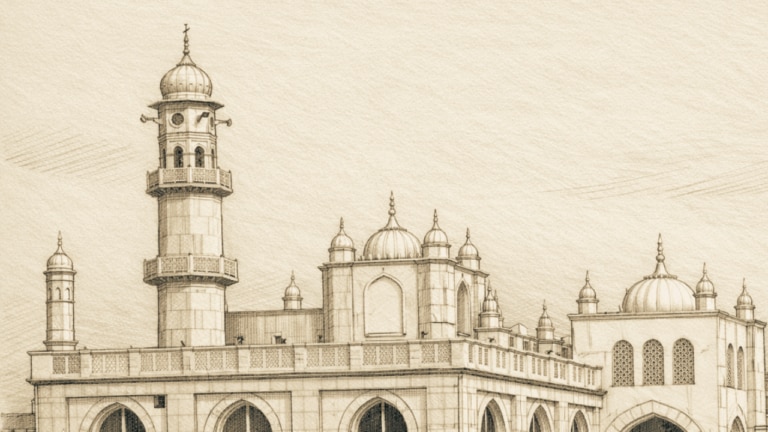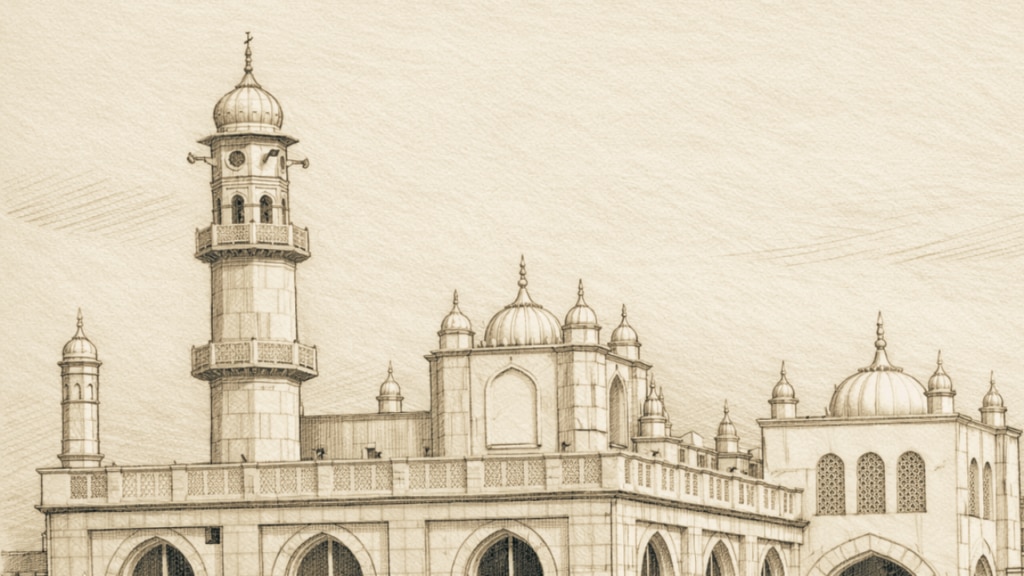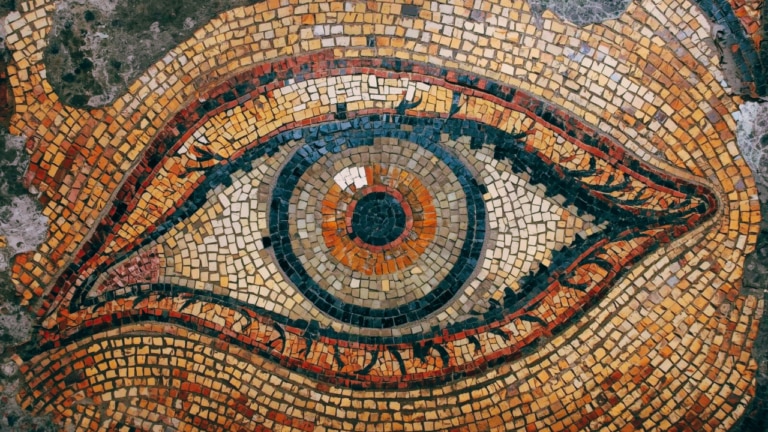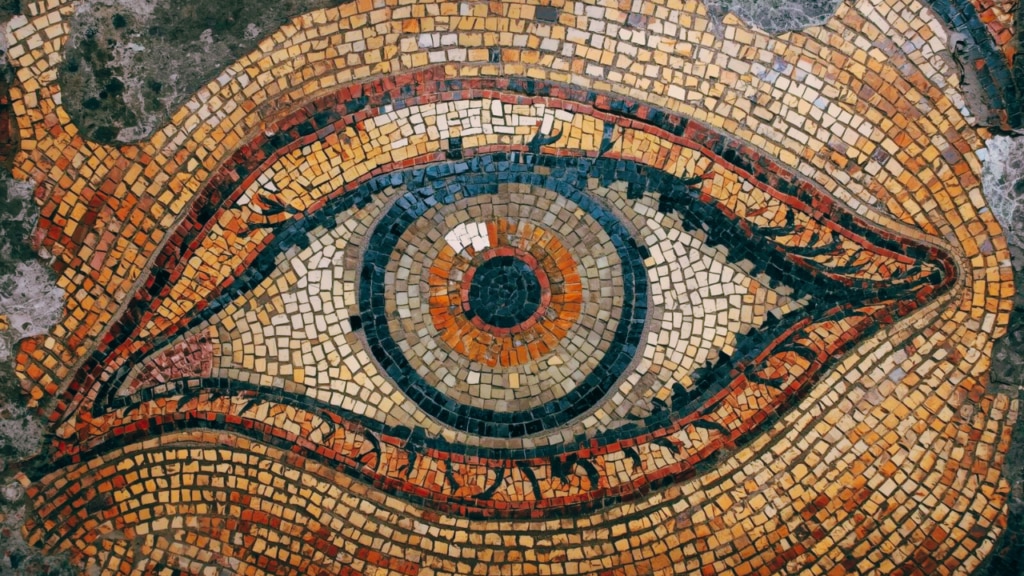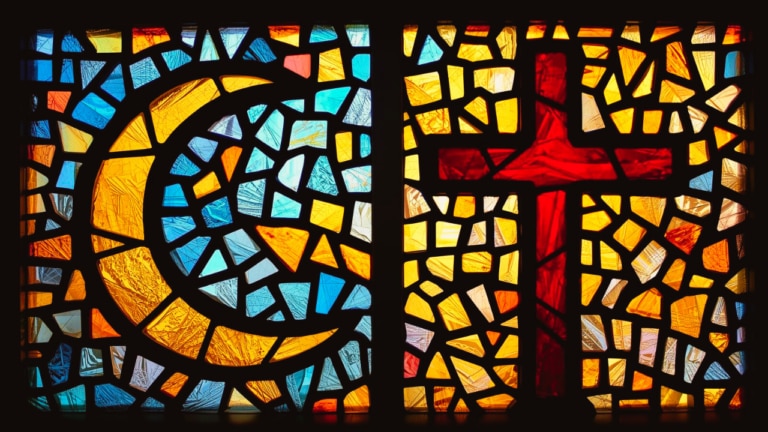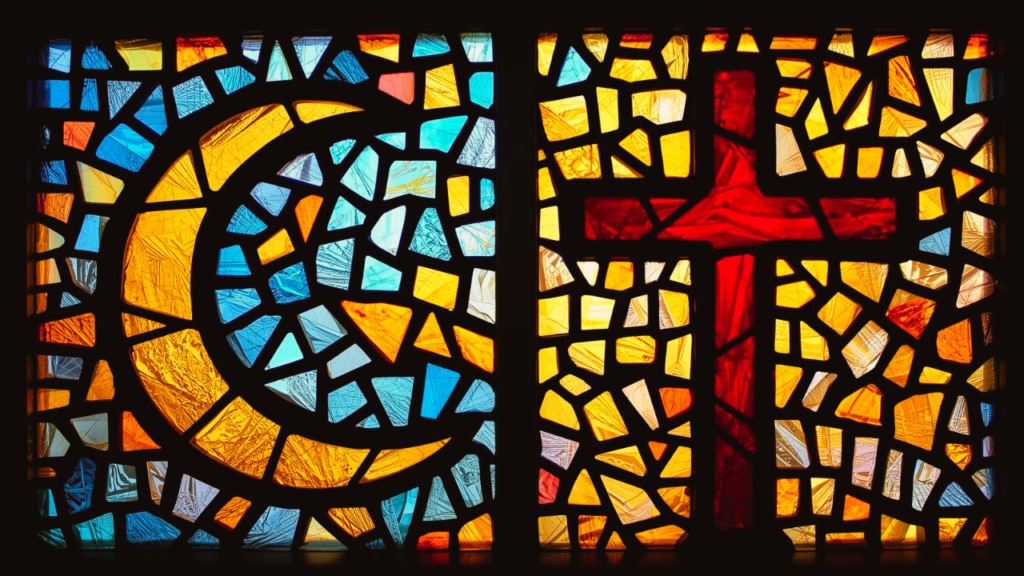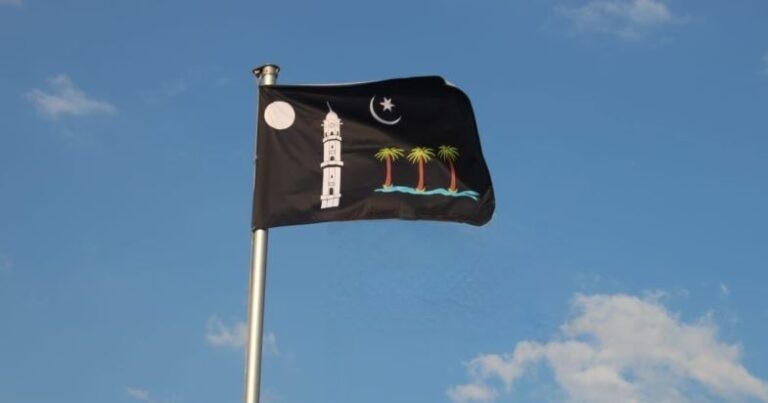Friday Sermon
19 December 2025
Muhammadsa: The excellent exemplar – Uswatun Hasanatun
After reciting the tashahhud, ta‘awwuz and Surah al-Fatihah, Hazrat Khalifatul Masih Vaa recited verse 22 of Surah al-Ahzab.
لَقَدْ كَانَ لَكُمْ فِيْ رَسُوْلِ اللّٰہِ اُسْوَۃٌ حَسَنَۃٌ لِّمَنْ كَانَ يَرْجُوا اللّٰہَ وَالْيَوْمَ الْاٰخِرَ وَذَكَرَ اللّٰہَ كَثِيْرًا
Allah the Almighty states:
“Verily you have in the Prophet of Allah an excellent model, for him who fears Allah and the Last Day and who remembers Allah much.”
Someone once asked Hazrat Aishara to share something in relation to the excellent morals and the noble character of the Holy Prophetsa. Upon this, Hazrat Aishara replied, “Have you not read the Holy Quran?” Allah the Almighty has Himself testified to his excellent character, as Allah the Almighty says:
وَاِنَّكَ لَعَلٰى خُلُقٍ عَظِيْمٍ
“And thou dost surely possess high moral excellences.” (The Holy Quran, Ch.68: V.5; Musnad Ahmad bin Hanbal, Vol. 8, Alam Al Kotob, Beirut, pp. 144-145)
Only those can serve as a model for others in any given quality, who possess an excellence in that very quality. As far as the Holy Prophetsa is concerned, whether it is in relation to the rights due to Allah the Almighty, or the rights due to His creation, the Holy Prophetsa held such a lofty status in regard to both virtues that Allah the Almighty Himself testified to it. Hence, Allah the Almighty has stated that the Holy Prophetsa is a model for you. Do not merely listen to his words, but also act in accordance with them; merely professing belief is not sufficient. When you act in accordance [with these teachings], then surely you will be able to obtain that rank for which Allah the Almighty sent his Messengersa. Hence, this is the responsibility of every Muslim, every believer. There are people in the world who perform a few good deeds, or they do something which becomes widely known and as a result, they become renowned and receive accolades and rewards. Some receive the Nobel Prize, whereas others receive other types of rewards. Nevertheless, this reward is given by a committee or the government, who are appointed for this task. However, it has never been the case that an entire nation has agreed upon something so unanimously. The true reward is that which was bestowed upon the Holy Prophetsa even before his prophethood, in his youth, when people called him Sadiq (the Truthful) and Amin (the Trustworthy). (Ibn Hisham, Al-Sirah al-Nabawiyyah, Dar Al-Kotob Al-Ilmiyah, Beirut, p. 155; Sahih al-Bukhari, Kitab at-tafsir, Hadith 4792)
Though he was not in need of any accolade, yet, in the eyes of the people, he had reached a station that was unparalleled, and the entire nation gave him this title. Hence, this is the lofty rank of the Holy Prophetsa and he himself said that “you should follow my sunnah and practice.” (Sunan Abi Dawud, Kitab as-sunnah, Hadith 4607)
Because Allah the Almighty has sent me for your reformation.
The Holy Prophetsa stated that he had been sent to perfect the high moral qualities. (Al-Bayhaqi, Al-Sunan al-Kubra, Vol. 10, Kitab ash-shahadah, Hadith 21379, Maktabat-ul-Rushd, Riyadh, p. 310)
Thus, only the one who personally possesses all these qualities can be said to have perfected his morals and possess all such attributes. As I have mentioned, Allah the Almighty Himself has said that the Holy Prophetsa is an excellent model for us. Therefore, we must give his life such great importance so that we act in accordance with every word of his. Furthermore, every word of his is in accordance with the teachings of the Holy Quran and it comes from Allah the Almighty. As such, the Holy Prophetsa is a perfect model for every moral quality a person possesses, or should possess, and also in demonstrating the attributes of Allah the Almighty. In the Introduction to the Study of the Holy Quran, Hazrat Khalifatul Masih IIra has also presented certain aspects of the morals and character of the Holy Prophetsa and they are also mentioned in books of sirah [biographical accounts of the Holy Prophetsa]. I will briefly mention some of these today, and whenever future opportunities arise, I shall continue to shed light on them.
The first aspect is the rights that are owed to God Almighty – i.e., the rights owed to His worship. What do we learn about this within the example of the Holy Prophetsa? We find that his entire life was immersed in the love of God. Despite the fact that he was made to shoulder enormous responsibilities – he had to disseminate the new religious law and morally train the people – just like the Promised Messiahas said, he turned savages into humans, then civilised humans and then ultimately transformed them into godly people. (Lecture Sialkot, Ruhani Khazain, Vol. 20, p. 206)
Despite the fact that this was such a heavy task, he never once forgot the rights owed to Allah the Almighty, which was to worship Him.
This is a point of vital importance. During this time, he was made to endure a great many difficulties as well. He had to participate in wars, and enemies attacked him. But he never wavered in fulfilling rights that were due to the worship of Allah. Thus, this is the shining example that we have before us – that we always keep God Almighty at the forefront of our affairs, for if we prioritise God Almighty in every situation, then all of our personal difficulties will be resolved naturally.
People often mention that they have this problem and that problem; that they have prayed in such and such manner – mentioning that they pray for their various difficulties – but the truth is that we do not fulfil the rights of God Almighty. This is why, then, people remain deprived.
God Almighty says you should also fulfil the rights that you owe to Him. And what was the standard of worship of the Holy Prophetsa? When night would fall, the Messengersa of Allah would stand up for prayer, meaning that after half the night had passed, he would rise for prayer, and God Almighty himself has testified to this. Hazrat Aishara narrates that on one occasion, when the Holy Prophetsa was standing for prayer at night, “I asked him, ‘O Messengersa of Allah, you are already the beloved of God Almighty. Why, then, do you subject yourself to such difficulties – spending a majority of the night worshipping and continuously weeping before God Almighty?’ He replied, ‘O Aisha:
اَفَلَا اَکُوْنَ عَبْدًا شَکُوْرًا
(Dibacha Tafsir-ul-Quran, Anwar-ul-Ulum, Vol. 20, p. 382)
While it is true that I am a beloved of God and that out of His grace, He has bestowed this station of nearness to me, is it not my responsibility then to express my gratitude to Him? After all, gratitude is expressed in response to benevolence.
Thus, look at how, as a result of being made the final law-bearing Prophet and having been given the final book of religious law by God Almighty through Divine grace, he responded by asking, “Shall I not be grateful?”
There are many blessings that God Almighty has bestowed upon every human being. And it is incumbent upon us to express our gratitude and to strive to raise our standards of worship. People ask at times, especially the youth, who come and ask, “How can we worship God Almighty? What need does God Almighty have for our worship?” Affected by the prevailing environment of modernity, youngsters ask this question. The answer is: God Almighty does not stand in need of our worship.
But do not the spiritual and worldly blessings that He has bestowed upon you demand that you then fulfil the right of expressing gratitude to Him in exchange for His favours upon you and that you become His grateful servants?
Similarly, it is also recorded in the biographies of the Holy Prophetsa that when he would hear the word of Allah being recited, his eyes would well with tears, especially upon hearing those verses which emphasised the great duties and responsibilities he had been given.
Thus, it is recorded that one day, the Holy Prophetsa asked Hazrat Abdullah bin Mas‘udra to recite some portion of the Holy Quran to him. Hazrat Abdullahra responded, “The Holy Quran has been revealed upon you directly, O Messengersa of Allah. How could I recite a portion to you?”
The Holy Prophetsa stated, “I like to have others recite the Holy Quran to me so that I may listen to it.” Hazrat Abdullah bin Mas‘udra says that upon this, I began to recite Surah an-Nisa to him. When, while reciting, I reached this verse:
فَكَيۡفَ إِذَا جِئۡنَا مِن كُلِّ أُمَّۂٍ بِشَهِيدٖ وَجِئۡنَا بِكَ عَلَىٰ هَـٰٓؤُلَآءِ شَهِيدٗا
Meaning, “What will be the condition when We will bring forth from every nation their prophet, and stand him before his people and pass judgement on that nation, and We will also stand you before your nation and take them to account.” Then the Holy Prophetsa said, “Enough, enough.” The Companion says, “I looked towards him, and tears were flowing from his eyes.” (The Holy Quran, Ch.4: V.42)
Such fear of God had overtaken him, and at that moment, he was surely also concerned about his people, lest they should commit such an act that becomes a cause of Allah the Almighty’s displeasure, and then he be required to give testimony against them. Thus, one aspect also emerges from this: that where there are many matters whereby the Holy Prophetsa shall testify in our favour, at the same time, we should also fear, lest the testimony of the Holy Prophetsa be against us, lest such truths become apparent that would expose our sins, so that we become deserving of Allah the Almighty’s punishment. Thus, this is something to greatly fear. We too should fulfil the due rights of worship, and we should possess such a love for Allah the Almighty which the Holy Prophetsa instructed us to have and which Allah the Almighty has commanded us in the Holy Quran.
Take the example of the observance of prayer: the Holy Prophetsa was so mindful of it that even during severe illness – in the final days when permission was granted to lie down whilst offering prayer – it is recorded in history that he went to the mosque by using others as support. And one day, when he could not come, he instructed Hazrat Abu Bakrra to lead the prayer. During this time, when he felt some improvement in his health, taking the support of two men, he immediately set out towards the mosque. Hazrat Aishara states that even in that condition, the situation was such that both his feet were dragging on the ground. (Dibacha Tafsir-ul-Quran, Anwar-ul-Ulum, Vol. 20, p. 383)
But the importance of congregational prayer was his main objective. He bore that hardship because he wished to show its importance to the Muslims. Dragging his feet, he reached there. He went into the mosque, showing no concern about his illness. This was the state of his love for Allah the Almighty, and regarding this, he would morally train people as well. On the one hand, there is his attention to the observance of prayers, and on the other, how he would instil the greatness and grandeur of Allah the Almighty in the hearts of people.
It was a custom among the Arabs to clap in order to draw attention, and this custom was common at that time. But the Holy Prophetsa abolished this custom and said that in its place there should be the remembrance of Allah. In this regard, it is written that once the Holy Prophetsa was occupied in some matter, when the time for prayer arrived. He said, “Tell Abu Bakr to lead the prayer.” In the meantime, he finished the task and immediately proceeded towards the mosque. When he reached the mosque, Hazrat Abu Bakrra was leading the prayer. When the people came to know that he had arrived in the mosque, those offering the prayer began clapping in worry. On the one hand, the intent of this was to show that their hearts had become extremely joyful due to the Holy Prophet’ssa arrival, and on the other hand, they wanted to draw Hazrat Abu Bakr’sra attention, that now your leading of the prayer has ended, because the Holy Prophetsa has arrived. Hazrat Abu Bakrra stepped back and left the place of the Imam for the Holy Prophetsa. After the prayer, the Holy Prophetsa said, “Abu Bakr, when I had instructed you to lead the prayer, why did you move back?” Hazrat Abu Bakrra stated with such sincerity, “In the presence of Allah’s Messengersa, what status does the son of Abu Quhafah have that he should lead the prayer?” Then the Holy Prophetsa turned towards the Companions and said, “What was your purpose in clapping? In the remembrance of God, clapping is not appropriate. When such a matter arises during the prayer to which it is necessary to draw attention, then instead of clapping, one should loudly proclaim the name of God. One should say ‘SubhanAllah’ [Holy is Allah]. When you do this, then the attention of others will automatically turn towards that matter.”
Similarly, the Holy Prophetsa did not like the habit of undue and unnecessary hardship and trouble. Despite drawing attention to so much worship, he said that there should be no undue hardship or trouble in one’s practice. Once, the Holy Prophetsa went into a house and saw that a rope was hanging between two pillars. He asked, “Why is this rope tied?” People informed him, “This is the rope of Hazrat Zainabra. When she becomes tired while worshipping, she takes support by holding this rope.” The Holy Prophetsa said, “This should not be done. Untie this rope. Every person should worship only for as long as their heart remains inclined towards it. When they become tired, they should sit down. This kind of strain-filled worship cannot bring any benefit.” (Dibacha Tafsir-ul-Quran, Anwar-ul-Ulum, Vol. 20, p. 384)
On the one hand, this demonstrates that under the influence of his moral training, the female Companions as well as members of his household and family, possessed a great desire for worship and would even subject themselves to hardship. On the other hand, he also stated that there is no need to impose hardship; rather, worship should be performed with ease. However, I should also clarify for people that this does not mean what some people have begun to say nowadays, that since there is no need to impose hardship, one should offer the prayer hastily, merely to fulfil an obligation, discharging it as if it is a burden, and be done with it. This is, in fact, a complete reversal of the true meaning of this guidance, whereby people have started to interpret it as creating personal convenience.
Nowadays, some of the people who come for worship, offer the prayer and finish within a few minutes; or if they pray at home, they are done within a few minutes. On many occasions, people even ask me how the prayer should be offered. The prayer should be offered with care and in a befitting manner. In this regard, there is a Hadith of the Holy Prophetsa in which he instructed a Companion to offer the prayer again, three or four times. That Companion had arrived late to the gathering of the Holy Prophetsa. The Holy Prophetsa was seated in the gathering after offering the prayers. The congregational prayer was finished, and there was a gathering underway. Each time the Companion offered the prayer and returned to him, the Holy Prophetsa would say, “Go back and offer the prayer again.” He would return after offering the prayer, and the Holy Prophetsa would again say, “Go back and offer the prayer again.” In this manner, he instructed him to offer the prayer three or four times. When the Companion submitted that he did not know a better way of offering the prayer and asked him to explain how it should be offered, the Holy Prophetsa said: “Offer the prayer calmly and with composure; remember Allah, recite the Durood, and remember His Oneness and praise Him. The bowing and prostration should also be performed properly.” (Sahih al-Bukhari, Kitab al-adhan, Hadith 793)
Therefore, keep this matter in mind as well. It is not that offering the prayer with ease means offering it hastily just because there is a narration which states that one should offer the prayer with ease. It does not mean that if one feels sleepy, one should quickly offer the prayer in merely a few minutes. In fact, offering the prayer in a state of intoxication is, in any case, forbidden. This is not permissible. Rather, when one offers the prayer, one must fulfil its due right. This, too, has been emphatically enjoined.
The Holy Prophetsa detested shirk [associating partners with Allah] to such an extent that even at the time of his demise, when he was in pain during his final moments, he would at times lie on his right side and at times on his left, and would repeatedly say: “May Allah curse those Jews and Christians who turned the graves of their prophets into places of worship.” (Dibacha Tafsir-ul-Quran, Anwar-ul-Ulum, Vol. 20, p. 385)
That is, they prostrated before the graves of their prophets and supplicated to them. By this, he meant that if my community, after me, were to commit such an act, they should not think that they would thereby become deserving of my prayers; rather, I would be completely dissociated from them.
As has already been mentioned, Allah the Almighty will take testimony [from the Prophets]. One can observe that in Medina the authorities have imposed strict restrictions at the blessed grave of the Holy Prophetsa; for this very reason, no one is allowed to prostrate there or even get too close. However, in many Muslim countries, prostrations are made at the shrines of saints and leaders of religious groups, and vows and supplications are made to those saints. This practice is shirk, the very thing which the Holy Prophetsa forbade, and which he forbade even with regard to his own person. Then what right does any other saint or religious leader or elder have that prostration should be made at his grave? It is by the grace of God Almighty that, by accepting the Promised Messiahas, we have safeguarded ourselves from these practices; nevertheless, we must still strive to reach the proper standards of worship. Among others, i.e. the rest of the Muslims, this practice is widespread. May Allah the Almighty have mercy on them as well and grant them reason and understanding so that they may desist from this shirk.
The extent of the Holy Prophet’ssa humility before Allah the Almighty was such that when people said to him, “O Messengersa of Allah, through the strength of your deeds you will surely attain the grace of Allah, for Allah the Almighty has granted you a certification, praised your morals and has established your example as a standard of conduct for the Muslims. This means that your deeds are such that Allah the Almighty will forgive you, or has already forgiven you.” He replied, “No, no; I too shall be forgiven only by the grace of Allah.”
Accordingly, Hazrat Abu Hurairahra relates that one day he heard the Messengersa of Allah say: “No person will enter Paradise by virtue of his deeds alone.” I submitted, “O Messengersa of Allah, will you also not enter Paradise by virtue of your deeds?” He replied, “I too cannot enter Paradise on the strength of my deeds; rather, the only means is if I am covered in the mantle of Allah’s grace and mercy.” This is a narration from Sahih al-Bukhari. (Dibacha Tafsir-ul-Quran, Anwar-ul-Ulum, Vol. 20, pp. 386-387; Sahih al-Bukhari, Kitab al-marda, Hadith 5673)
Thereafter, he advised us, saying: “Ensure your actions are in line with righteousness and seek the paths that draw you closer to Allah the Almighty”. He further said: “None of you should ever wish for death. If a person is righteous, then by remaining alive he will increase further in righteousness; and if he is sinful, then by remaining alive he will be granted the opportunity and could incline towards repentance of his sins.” (Sahih al-Bukhari, Kitab at-tamanni, Hadith 7235)
This is very important guidance which we must bear in mind: one should never desire death. He explained the reason for this by saying that if one does so because of hardship – for it is always due to some hardship or pain that a person wishes for death – and if one has some good deeds, then Allah the Almighty will grant further ability to perform good deeds and will make better arrangements for them in the Hereafter and forgive their sins. And if they have committed sins, then they will be granted the opportunity to seek repentance and forgiveness if their attention has been drawn towards it, and thus they will be saved from sins and will attain the nearness of Allah the Almighty. And when the time of their demise approaches, then Allah the Almighty may even provide the means for their forgiveness.
The standard of worship that he himself maintained has already been observed; however, he also consistently drew the attention of others towards it. It is related in a tradition that on one occasion, during the night, he went to the house of his son-in-law, Hazrat Alira, and his daughter, Hazrat Fatimara, and asked them whether they observed the Tahajjud prayer. Hazrat Alira submitted, “O Messengersa of Allah, we do try to offer it, but when, according to the will of God Almighty, our eyes remain closed at times, then the Tahajjud is missed.” Upon this, he said, “Observe the Tahajjud prayer,” and then stood up and proceeded towards his home. While returning, he repeatedly recited the words:
وَکَانَ الْاِنْسَانُ اَکْثَرَ شَیْءٍ جَدَلًا
That is, “But of all things man is most contentious.” (The Holy Quran, Ch.18: V. 55). In other words, a person hesitates to acknowledge his own shortcomings and instead conceals his faults by advancing various arguments.
Thus, the Holy Prophetsa advised them directly and explained the matter to them, and even while returning, he continued to repeat this point so that others too might convey its meaning to Hazrat Alira. Through this, he taught the lesson that what Hazrat Alira should have stated is, “At times we err and do not wake up,” rather than attributing it to God Almighty and saying, “If God Almighty had so willed, we would have awakened; otherwise, we remained asleep.” His purpose was to explain why one should not ascribe one’s own shortcomings to God Almighty.
As has already been stated, the Holy Prophetsa did not approve of any kind of pretence or undue hardship in worship. On one occasion, when he saw ropes hanging in the house, he instructed that they be removed. His principle was that the faculties which God Almighty has bestowed upon man should be utilised correctly, and this alone constitutes true worship. To close one’s eyes despite having them, or to deliberately disable them, is not worship; rather, it is an act of irreverence. Misuse of these faculties, however, is indeed sinful.
In the present age, one may observe that there are numerous attractions and desires in the world that draw people towards themselves. If one becomes inclined towards them, watches inappropriate programmes on television, views improper material on the internet, or looks at anything indecent, then this constitutes sin. He taught that safeguarding oneself from such sin is the essential matter, and it is this restraint that becomes a source of reward.
Similarly, blocking one’s ears is not a virtue. God Almighty has granted a faculty; why then should it be suppressed? Rather, this too is irreverence, for God Almighty has bestowed a blessing which one is wasting. Yes, listening to backbiting and speaking ill of others is sinful. There are many who both engage in backbiting and listen to it, who hear false and harmful things about others, and even derive pleasure from it, laughing while listening to people’s weaknesses and faults. Such conduct is wrong and sinful, and with regard to this, he instructed that such actions should be avoided.
The Holy Prophetsa stated that moral excellence means the proper use of one’s natural faculties. To suppress these faculties is foolishness; to employ them in unlawful pursuits is immorality; and their correct and rightful use is virtue. This is a concise summary of his teachings, and indeed, this is the very essence of the life of the Holy Prophetsa. It is for this reason that God Almighty has commanded us to adopt the life of the Holy Prophetsa as a perfect model.
Regarding his conduct, Hazrat Aishara states at one place that there never arose an occasion in the life of the Messengersa of Allah where two options were presented to him and he did not choose the easier of the two, provided that there was no trace of sin in choosing the easier path. Thus, when two paths were available – one easy and one difficult – his effort was always to adopt the easier course, for God Almighty does not wish to place people under unnecessary hardship. However, whenever there was even the slightest suspicion that the easier path might lead to sin, he would avoid it entirely and adopt the longer or more difficult path. Indeed, it may be said that even the faintest doubt would cause him to distance himself from it to an extent unmatched by any other human being.
One may observe in the world that, at times, people deliberately place themselves in hardship in order to deceive others and to display supposed extraordinary qualities, claiming that they have performed great spiritual struggles. So-called spiritual leaders also relate such tales. However, the Holy Prophetsa sought the path of ease, for those who engage in such ostentation merely subject themselves to hardship to proclaim their own greatness or to solicit praise. They do not act for the sake of God Almighty, for God Almighty derives no benefit from their suffering, nor do they earn any reward from it. Such acts are performed to deceive people, and when a person acts with the intention of deception, God Almighty, due to this ill-intent of theirs, grants sin rather than reward.
Some people engage in exaggerated displays in order to conceal their own faults, attempting in one way or another to draw a veil over their weaknesses, while loudly proclaiming their supposed virtues and the hardships they endured for them. Concerning such conduct, God Almighty declares that these deeds will not draw one nearer to Him; rather, they will become a cause of His displeasure, because the intention is not pure. Such actions are undertaken to win the favour of people, in the hope that public display may incline others in their favour. Thus, these subtle yet profound lessons were imparted by the Holy Prophetsa through both his practical example and verbal admonition.
As far as his relations with fellow humankind are concerned, we can observe the example of the Holy Prophetsa in his own home and his treatment of his wives. The Holy Prophetsa treated his wives with great compassion and justice. If people of the present age were to understand this, many domestic disputes and conflicts would be resolved. At times, his wives would speak sternly or express displeasure, yet he would calmly smile and overlook it.
On one occasion, he said to Hazrat Aishara, “O Aisha, I always know when you are displeased with me.” She asked how he perceived this. He replied, “When you are pleased with me, and the occasion arises to take an oath, you say, ‘By the Lord of Muhammadsa, it is so’; but when you are displeased with me and need to take an oath, you say, ‘By the Lord of Ibrahimas, it is so.’” Upon hearing this, Hazrat Aishara laughed and affirmed that he had understood correctly.
Then there are the accounts relating to Hazrat Khadijara, who was his first and eldest amongst his wives, and who made immense sacrifices for his sake. After her demise, the Holy Prophetsa married younger wives, yet he never forgot his bond with Hazrat Khadijara. Whenever her friends visited, he would stand to receive them, and whenever any item prepared by her came before him, tears would flow from his eyes.
During the incident of the Battle of Badr, one of his sons-in-law, who had not yet accepted Islam, was brought as a prisoner and possessed no wealth with which to pay his ransom. When his wife – the daughter of the Messengersa of Allah – saw that there was no other means to secure her husband’s release, she sent to Medina her mother’s final keepsake, a necklace, as ransom. When this necklace was presented before the Holy Prophetsa, he recognised it, and his eyes welled up with tears. He addressed the Companions, saying, “I do not command you, for I have no right to issue such a command, but I know that this necklace is Zainab’s last memento of her mother. If you are willing to do so of your own accord, I recommend that the daughter not be deprived of her mother’s final keepsake.” The Companions replied, “O Messengersa of Allah, what greater source of joy could there be for us than this?” Accordingly, they returned the necklace to Hazrat Zainabra.
The kindnesses shown to him by Hazrat Khadijara had such a profound effect upon the Holy Prophetsa that he would frequently mention her in the presence of his wives. On one occasion, as is related, that, at times, there can be some feelings of unhappiness or jealousy amongst the wives if one of the wives is praised more, even if she has passed away. As such, on one occasion, the Holy Prophetsa praised Hazrat Khadijara before Hazrat Aishara, whereupon she said, “O Messengersa of Allah, why do you continue to mention that elderly woman? Let the matter rest now. God Almighty has granted you younger and more beautiful wives in her place.” Upon hearing this, the Holy Prophetsa was deeply moved and said, “Aisha, you do not know how greatly Khadija served me.” (Dibacha Tafsir-ul-Quran, Anwar-ul-Ulum, Vol. 20, pp. 389-393)
What was the standard of the Holy Prophet’ssa excellent morals? If we look back at history, we observe that even before the Holy Prophet’ssa birth, his father passed away, and his mother passed away when the Holy Prophetsa was a child. He spent the first eight years of his life under the care of his grandfather. Thereafter, the Holy Prophetsa was raised under the care of his uncle Abu Talib. On account of being related by blood, and also because Abu Talib’s father had especially advised him at the time of his demise regarding the Holy Prophetsa, Abu Talib had a special love for the Holy Prophetsa and took great care of him. However, Abu Talib’s wife did not possess the same kindness, nor a sense of fulfilling familial duties. If ever something came to the home, Abu Talib’s wife would often give it to her own children first and would remain unmindful of the Holy Prophetsa at a time when he was only just a child. When Abu Talib would return home, rather than seeing his young nephew crying or complaining, he would observe his own children eating something, while his young nephew remained a pillar of dignity as he sat to one side. In other words, from his very childhood, the Holy Prophetsa endured everything with great patience. Abu Talib would be overcome with the love of an uncle and with fulfilling familial responsibilities, and so he would run to his nephew, take him in his embrace and say, “Take care of this child of mine as well, take care of this child of mine as well.” This was a frequent occurrence.
Citing this narration, Hazrat Musleh-e-Maudra has written at one instance: “Those who were witnesses to this have testified that the Holy Prophetsa never complained or expressed any displeasure or expressed any stubbornness as a result of this, nor expressed any ill feeling towards his cousins. Later in life when his circumstances completely changed, he took upon himself the care and upbringing of two of his uncle’s sons, Hazrat Alira and Hazrat Ja‘farra, and discharged this responsibility in the most excellent manner.” (Dibacha Tafsir-ul-Quran, Anwar-ul-Ulum, Vol. 20, p. 393)
You can see that today, even in their adulthood, people hold on to grievances from their childhood and seek revenge. However, the Holy Prophetsa always extended kind treatment. These days, we observe that even after becoming older and reaching an age of maturity – if some people have to go and live with their relatives even to the age of 14 or 15 because they do not have a father or due to some other reason – if there is some sort of ill treatment committed by those relatives, then such things are never forgotten and they seek to exact revenge whenever the opportunity presents itself. However, the Holy Prophetsa never retaliated; to the contrary, when the time came, the Holy Prophetsa took his family members into his embrace, tended to their moral training and bestowed them with rank.
With regards to the Holy Prophet’ssa excellent moral character, observe yet another example of his patience: once, a woman whose son had passed away was mourning over his grave. The Holy Prophetsa passed by and said, “O woman, be patient. Everyone is subject to God’s will.” The woman did not recognise the Holy Prophetsa, and she said in response, “If ever one of your children were to die as mine has died, then you would know what patience really means.” As the Holy Prophetsa walked away, he said, “Not one, in fact, seven of my children have passed away.” (Dibacha Tafsir-ul-Quran, Anwar-ul-Ulum, Vol. 20, p. 394)
At such instances, this was the extent of what the Holy Prophetsa would say about difficulties he had previously endured; he never expressed anything more than this. He would never let his grief hinder his service to humanity.
The standard of the Holy Prophet’ssa forbearance was such that when God Almighty granted him rule and authority, even then, the Holy Prophetsa would pause to hear what everyone had to say. Even if someone acted in a harsh manner, the Holy Prophetsa would remain silent and never respond to a harsh person with harshness. It is recorded in history that rather than calling the Holy Prophetsa by his name, Muslims would address him by his spiritual rank; in other words, they would address him by saying “O Messengersa of Allah”. In accordance with their traditions and the customs of the time, non-Muslims would show respect by addressing him as “Abu al-Qasim” rather than addressing him as “Muhammad”, as Abu al-Qasim was his filial appellation, meaning “Father of Qasim”. This was because one of the Holy Prophet’ssa sons was named Qasim, who passed away.
Once, a Jewish person visited Medina and started arguing with the Holy Prophetsa. During his argument, he constantly said, “O Muhammad, the matter is such that […]” The Holy Prophetsa would respond to him without any reservation; however, the Companions grew restless upon observing the Jewish man’s audacity. Eventually, one Companion could not bear to see this any longer, and he said to the Jewish person, “Do not dare address him by his name whilst speaking to him. If you find yourself unable to say, ‘Messenger of Allah,’ then at least address him as ‘Abu al-Qasim.’” The Jewish person said, “I will use the name which his parents gave him.” The Holy Prophetsa smiled and said to the Companion, “Look, what he says is true. My parents named me Muhammad. Let him use the name he is calling me by, do not express any sort of anger.”
The Holy Prophet’ssa forbearance was such that sometimes, when he would go out for a certain task, some people would stop him along his way and start expressing their needs to him. The Holy Prophetsa would remain standing there until they had completed what they wished to say, and then the Holy Prophetsa would go along his way. Then, some people have the habit that when they shake hands, they continue holding on to the other person’s hand for a while; when this happened, the Holy Prophetsa would also hold on to the other person’s hand as well. Although this is not preferable, the Holy Prophetsa never moved his hand away from another’s. (Dibacha Tafsir-ul-Quran, Anwar-ul-Ulum, Vol. 20, pp. 394-395)
People with all sorts of needs would present their needs before him. At times, the Holy Prophetsa would grant them something to fulfil their need. However, compelled by their greed, they would ask for more, and the Holy Prophetsa would fulfil their desire. Sometimes people would continue making requests, and every time, the Holy Prophetsa would grant them something. In these circumstances, when the Holy Prophetsa saw someone to be particularly sincere, he would grant what that person requested, after which he would only say to the sincere person, “It would be better if you placed your trust in Allah.”
Once, a Companion continually persisted in requesting the Holy Prophetsa for money in order to fulfil his needs. The Holy Prophetsa fulfilled his request; however, in the end, he also said, “The best position is for one to place his complete trust in God.” The Companion was sincere and was also respectful. Out of respect, he did not return that which he had received; however, regarding the future, he said, “O Messengersa of Allah, this is the last time I will do this. From now on, under no circumstances will I make a request to anyone.”
There is an incident recorded regarding the same Companion, in which a battle was ongoing, and the condition on the battlefield was extremely precarious. Spears were being thrown, swords were being wielded, and arrows were being fired. Soldiers were fighting soldiers, and people were being killed. In the very midst of this, as the Companion was surrounded by opponents, his whip fell from his hand. A fellow Muslim soldier who was on foot thought that if the commanding officer were to dismount, it could lead to him being harmed; he bent down to pick up the whip and hand it back to him. That Companion saw this soldier and said, “My brother, by God, do not touch the whip.” Upon saying this, he jumped down from his horse and picked up the whip himself. Then he said to his comrade, “I vowed to the Holy Prophetsa that I would never make a request to anyone. Had I let you pick up the whip then, though I did not make a verbal request, there is no doubt that owing to the current circumstances, it would appear as though I am asking from you, and doing so would have made me act contrary to my oath. Though this is a battlefield, I will carry out my own tasks.” Even under those dangerous circumstances, he remembered his oath. (Dibacha Tafsir-ul-Quran, Anwar-ul-Ulum, Vol. 20, pp. 395-396)
These and many other accounts from the life of the Holy Prophetsa exhibit his justice, his regard for the sentiments of others, and his care for the poor, all of which are examples for us. His protection of the wealth of the poor and kind treatment of women – earlier I mentioned his treatment of his wives at home – but he generally treated women very kindly as well.
There are countless examples found in the blessed life of the Holy Prophetsa regarding service to humanity, kindness towards neighbours and good treatment of relatives. His life is full of lessons about how he strove to protect the property of others, how he concealed their faults, how he taught cooperation, and how he himself acted upon it. He exemplified how he forgave others and how he concealed the shortcomings of people. He imparted guidance on truthfulness, avoiding suspicion and thinking ill of others. He warned against despair, enjoined kindness even towards animals, and spoke of religious tolerance. All these are examples that form a perfect model for us.
As I have said before, insha-Allah, I will continue to mention such examples in the future as occasions arise. For now, I conclude this part here and will read out an excerpt from the writings of the Promised Messiahas. He states:
“That man who, through his own person, through his attributes, through his deeds, through his actions, and through the powerful river of his spiritual and pure life, manifested perfect excellence in knowledge and practice, in truthfulness and steadfastness, and who was called the Perfect Man – he is that blessed Prophet, the Seal of the Prophets, the Leader of the Chosen Ones, the Pride of the Messengers, our Master Muhammadsa.
O Allah, O Beloved God, send such blessings and peace upon this beloved Prophet as Thou hast never sent upon anyone since the beginning of the world.” (Itmam-ul-Hujjah, Ruhani Khazain, Vol. 8, p. 308)
May Allah the Almighty enable us to follow the example of the Holy Prophetsa and to strive to become true Muslims. May He also grant us the ability to spread his message throughout the world so that we may bring mankind under his banner. May Allah the Almighty enable us to do so.
اللَّهُمَّ صَلّ عَلَى مُحَمَّدٍ وَعَلَى آلِ مُحَمَّدٍ وَبَارِكْ وَسَلّمْ إِنَّكَ حَمِيدٌ مَجِيدٌ
[O Allah, send blessings upon Muhammadsa and upon the followers of Muhammadsa. Grant blessings and peace. Surely, You are Praiseworthy, Exalted.]
After the prayer, I shall also lead a funeral prayer. [Huzooraa enquired whether the funeral had arrived.] There is one present funeral, that is of Laiq Ahmad Tahir Sahib, who served as a missionary in the United Kingdom. He recently passed away at the age of 83.
اِنَّا لِلّٰہِ وَاِنَّآ اِلَيْہِ رٰجِعُوْنَ
[“Surely, to Allah we belong and to Him shall we return.”]
The deceased was a musi. He is survived by one daughter and three sons.
Laiq Tahir Sahib was born in Qadian to Hazrat Sheikh Fazl Ahmad Batalvira, a Companion of the Promised Messiahas. His father had taken the Bai‘at in 1907. After matriculation, Laiq Sahib devoted his life in 1959 and enrolled in Jamia Ahmadiyya Rabwah. He graduated from Jamia in 1966. During his Jamia studies, he also completed FA, Adeeb Fazil and Arabic Fazil qualifications, and after graduating, he earned a BA degree from the Punjab University.
In July 1967, he was sent as a missionary to England, where he served as Naib Imam of the Fazl Mosque, London. In 1970, he returned to Pakistan and continued his service under the Department of Islah-o-Irshad as a missionary in various regions. Later, he was transferred to the Tasnif Department. He was the son-in-law of Maulana Abul Munir Noor-ul-Haq Sahib.
During his service, he was appointed as a lecturer at Jamia and taught for about 10 years. In 1982, he was appointed as Naib Wakil-ut-Tabshir in the Wakalat-e-Tabshir office. During his Jamia years and his time as a missionary in Pakistan, he also rendered services in Khuddam-ul-Ahmadiyya and other auxiliary organisations.
In 1986, he was posted as a missionary to the United States, but later that same year, Hazrat Khalifatul Masih IVrh called him to the United Kingdom and appointed him to Glasgow, where he served as a missionary and muballigh. In 2005, when Jamia Ahmadiyya UK was established, he was appointed its first principal. His lifetime of service spanned approximately 59 years.
Ataul Mujeeb Rashed Sahib, Imam of the Fazl Mosque, London, writes:
“The late Laiq Ahmad Tahir Sahib was a devotee of Islam, a loyal servant of Khilafat, and one who fulfilled the demands of Waqf-e-Zindagi in an exemplary manner. He was a highly successful missionary who served the faith for a long period with utmost devotion. His recitation of the Holy Quran was melodious and deeply moving. He would speak on matters of moral training in a most captivating and effective manner. Wherever he served, he left behind lasting and fond memories. He was a beloved servant of the faith who showed love and affection towards members of the Jamaat. He also rendered many services in the field of writing. He was particularly devoted to prayer. His home was adorned with inscriptions of prayers written on its walls. He possessed many excellent qualities.”
Mubarak Siddiqi Sahib writes:
“I have known him since the days in Rabwah. He was very cheerful and possessed a noble and dignified nature. His devotion to Khilafat and the administrative system of the Jamaat was deep and sincere. He would always advise others to show absolute obedience to the Khalifa of the time. He always kept a small notebook in his pocket, in which he would immediately note down any good thing he heard or observed, wherever it came from. He did not distinguish whom he would take guidance from, but anywhere he heard a good word, he would write it down. From his student days, he had made it a habit to sit in the company of the elders of the Jamaat. He remembered many sayings of Hazrat Hafiz Mukhtar Ahmad Shahjahanpuri Sahibra and would often recount them in his gatherings.”
His daughter, Qurratul Ain, says:
“One quality of my father that stood out most prominently was the way he prayed. His prayers were filled with passion, humility, reliance on God and a loving pleading before Allah. It often felt as though he would not stop praying until he received an answer from God. And indeed, Allah the Almighty treated him with special grace. On many occasions, Allah the Almighty would inform him beforehand through dreams about various matters. He used to remind us of a saying of the Promised Messiahas: ‘He who asks dies a death, so die and then ask.’ This is the real point – that the one who asks should be in such a state, as though he has died; and when you ask in that condition, Allah the Almighty indeed listens.”
May Allah the Almighty grant him His forgiveness and have mercy upon him. May He elevate his station. His funeral is present, and I shall go outside to lead the funeral prayer after the Jumuah prayer.
The second funeral is in absentia. It is for respected Sega Jalloh Sahib, Naib Sadr of the Segou Region in Mali. He too recently passed away.
اِنَّا لِلّٰہِ وَاِنَّآ اِلَيْہِ رٰجِعُوْنَ
[“Surely, to Allah we belong and to Him shall we return.”]
The deceased was also a musi.
The missionary, Ta’sir Sahib, writes that the late Sega Jalloh Sahib accepted Ahmadiyyat in 2016 after listening to a radio programme and that he made great progress in faith. He was a devoted and active Ahmadi, always at the forefront of Jamaat programmes and financial sacrifices. He would attend the mosque daily for Fajr, Maghrib and Isha prayers, even though it was far from his home. His love and devotion for Khilafat were immense.
In 2018, he was blessed to join the Wasiyyat scheme and continued to pay his Wasiyyat contributions regularly at the beginning of every month until his passing. Once, for six months, he did not receive his salary due to certain local circumstances in Africa, yet he was deeply troubled that he could not make his payments. When Allah granted ease, and he received his salary, the very first thing he did was pay his chanda Wasiyyat and other contributions.
He is survived by his wife and three sons. He would preach to his family, and by the grace of Allah, two of his sons accepted Ahmadiyyat, although his wife and one son did not, which caused him deep concern. His faith in Ahmadiyyat was strong and unwavering. His views regarding non-Ahmadis and clerics were clear and firm; he would say that they can never succeed unless they accept the Promised Messiah and Mahdias. He was a devoted preacher and an active servant of the Jamaat.
May Allah the Almighty grant him His forgiveness and have mercy upon him.
(Official Urdu transcript published in the Daily Al Fazl International, 9 January 2026, pp. 1-8. Translated by The Review of Religions.)

